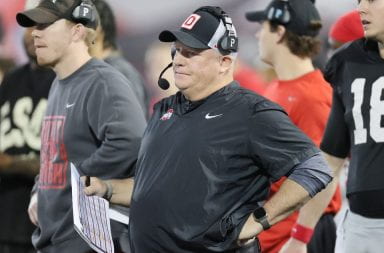In his own words, Joe Montgomery was a “thug” when he came to Ohio State.
“Going back to high school I was involved in a lot of … let’s just put I was involved in a lot of bad things,” the former OSU running back said.
Seven years after leaving OSU to play for the New York Giants, the thug of years past completed his bachelor’s degree in sociology and received his diploma on June 12 during spring quarter commencement.
Montgomery, who was on the football team from 1994-98, summed up his trip succinctly.
“From gangster to graduate,” he said, flashing a smile. “I like that ring.”
That journey was filled with hurdles. Montgomery lived in a world of gangs, guns and drugs growing up in the notorious Cabrini-Green projects of Chicago. It was so bad in his neighborhood he said it felt odd to sit on his off-campus porch in Columbus and not worry about drive-by shootings.
Montgomery said he never touched a football until he was 16, but his two years of high school ball earned him a chance to play at OSU. He came to Columbus thinking he was on scholarship, but learned he was a Prop 48 player, meaning poor academics would force him to pay his own tuition and sit out his freshman year.
“I was ready to come home and just give it up and just go back to being like the rest of my uncles, dealing drugs and being in gangs,” he said.
At that point, his mother Renee said something that influenced Montgomery’s future actions.
“She said, ‘Joseph, make me proud.’ When she said that it kind of blew me back a little bit and I knew that everything was on me. I just didn’t represent Joseph Montgomery; I represented my mother, my father, from their struggles.”
Montgomery worked his way through freshman year, but would deal with more setbacks during his time at OSU.
“November 2, 1996, I just totally destroyed my kneecap,” he said. “(The doctors) said I’d never play football again and the first thing I said was, ‘How are you going to tell me what I’m not going to do.’ Nobody dictates what I do.”
He recovered to post an excellent senior season. While sharing time with Michael Wiley, Montgomery played in all 12 games. He scored seven touchdowns, ran for 766 yards and averaged 3.5 yards per carry.
After that season, despite having never started at OSU, Montgomery was chosen by the New York Giants as the 49th pick in the NFL Draft. He played two seasons with the Giants before missing the 2001 season with another leg injury. He finished his career in 2002 with the Carolina Panthers. In three seasons he scored four touchdowns and ran for 372 yards.
More than two years after the end of his NFL career, Montgomery decided something was missing. After discussing it with his wife, he decided to come back to OSU for the final three classes he needed for a degree.
“It’s not just on me,” he said. “I’m carrying the weight of other people. How could I tell my daughter to get an education if I didn’t get one?”
He was quick with a quip and a smile when asked what he’s been doing since leaving the NFL.
“I’ve owned quite a few businesses,” he said. “I’m a businessman. That’s one thing about being a gangster and a drug dealer; you know how to diversify your money.”
In reality, he has worked in and around Columbus while doing some broadcasting work for WBNS-AM and NBC Channel 4.
Charismatic, witty and commanding, Montgomery has also spoken to youth in troubled areas like the one from which he came.
“When I go into schools I tell those guys, ‘Look, I owe you. I don’t even know none of you son of a guns, but I owe you. I owe you to be here to talk to you and let you know that you can do what I am doing right now,'” Montgomery said.
“Sometimes you want other kids not to follow in your direction but to be better than you are.”
Coach Jim Tressel said that graduation is just as large a victory off the field as any victory on it.
“I guess that’s why it’s one of the only times that the Victory Bell rings,” Tressel said. “It rings when we win football games, but it rings on graduation day for every Ohio State student, and these guys will hear that one maybe even louder and clearer than any other victory.”
For Joe Montgomery, far removed from the slums of Chicago, that victory is quite tangible.


